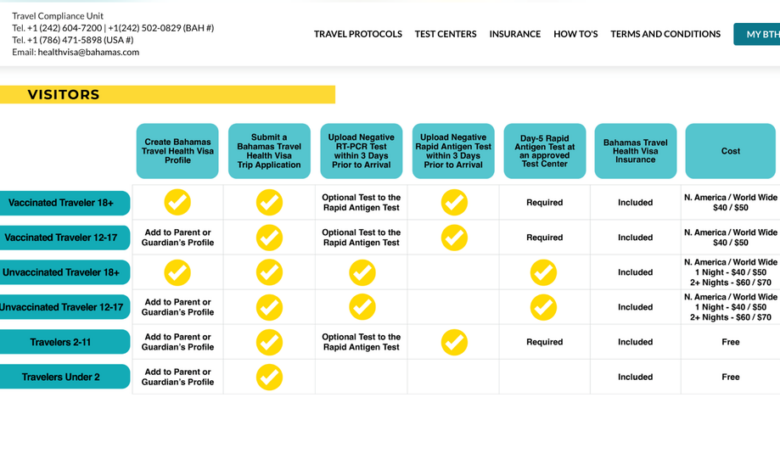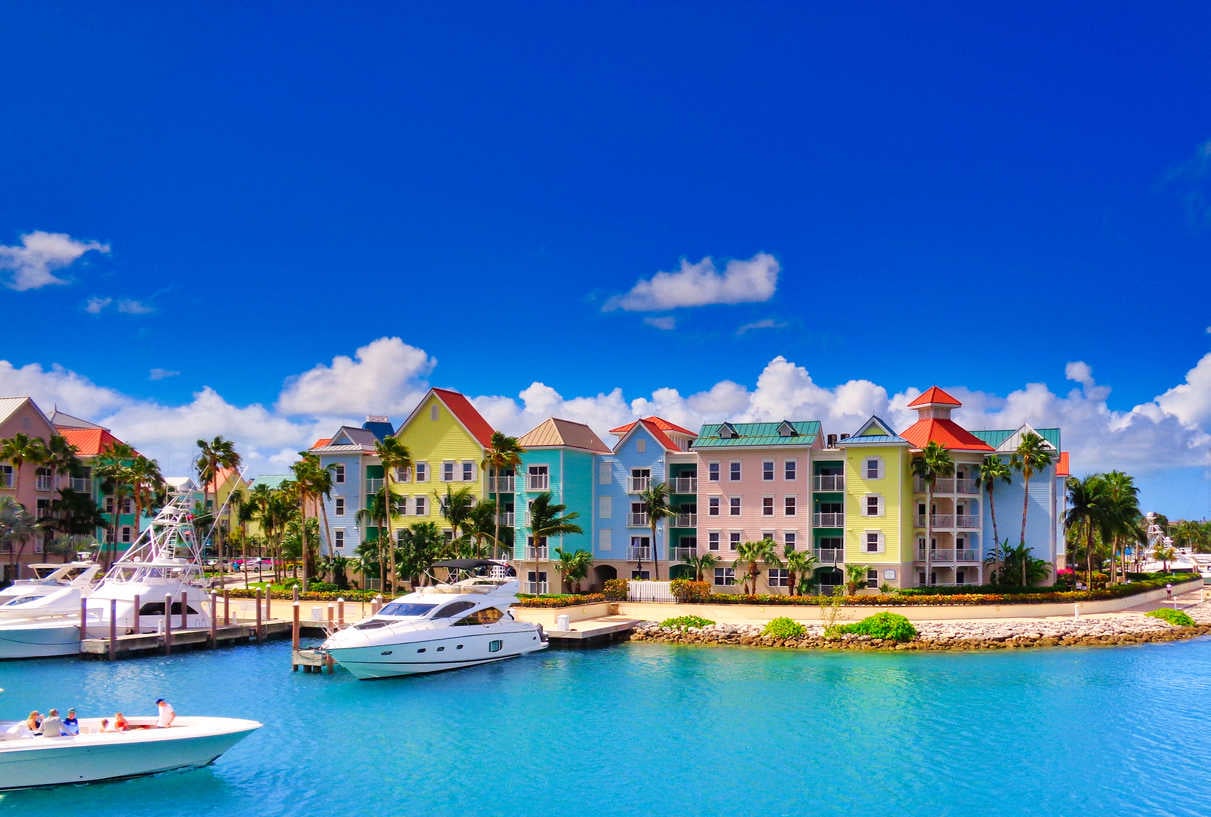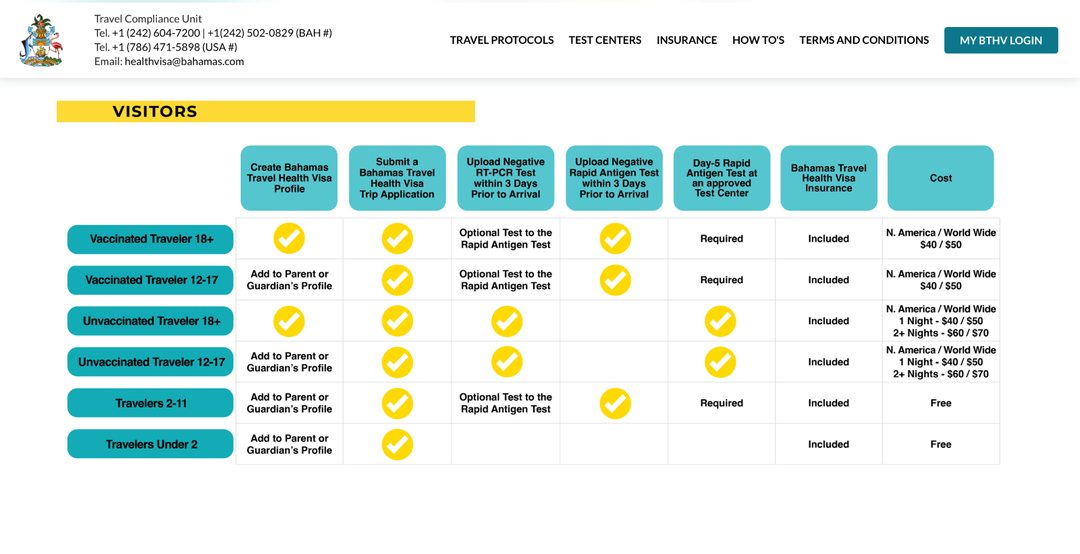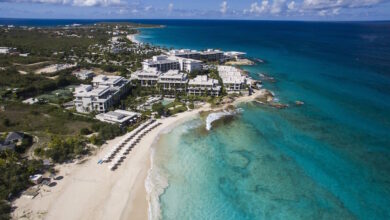
Bahamas Requires COVID Test for All Visitors
Bahamas require COVID test for all visitors, a new rule impacting travel plans for those hoping to enjoy the beautiful beaches and vibrant culture. This policy, implemented recently, necessitates a COVID-19 test before arrival, affecting everything from pre-trip preparations to potential travel delays. This post delves into the specifics of this requirement, from accepted test types to exemptions and practical considerations for travelers.
The Bahamas’ COVID-19 testing policy for visitors is now in effect. This new requirement has implications for travelers and could impact tourism numbers. This post aims to provide comprehensive information to help you navigate this policy and prepare for your trip.
Overview of the Requirement
The Bahamas recently implemented a COVID-19 testing requirement for all visitors, marking a significant adjustment to its pre-pandemic travel protocols. This policy mandates pre-arrival testing, ensuring the safety of both incoming travelers and the Bahamian population. Understanding this requirement is crucial for anyone planning a trip to the archipelago.The policy has evolved from initial travel advisories to a more formalized, stringent testing mandate.
This shift reflects the ongoing global health situation and the need for adaptable measures to mitigate the spread of the virus. The evolution has involved multiple iterations and updates, responding to the changing nature of the pandemic and the recommendations of health authorities.
Current Status of the Policy
The policy remains active, requiring all visitors to present a negative COVID-19 test result taken within a specific timeframe before arrival. This requirement is an essential part of the Bahamas’ current travel protocols.
Official Government Websites
The official sources for the most up-to-date information regarding this requirement can be found on the following government websites:
- Ministry of Health: Provides crucial details about the health regulations, including the specific testing criteria and the required documentation. This site is a primary resource for comprehensive information regarding the latest policy updates and testing requirements.
- Ministry of Tourism: Offers valuable information for travelers, including current travel advisories and recommendations. This is an important site for travelers to get a clear and accurate overview of the current policy.
Testing Details
The testing requirements include specific criteria for the type of test, the validity period of the negative result, and the acceptable methods of documentation. For example, a PCR test is often preferred, while other types of tests may be accepted depending on the guidelines. All visitors should carefully review the official government websites for the precise specifications to avoid any potential issues at the point of entry.
Documentation Requirements
The policy necessitates that visitors submit documentation of a negative COVID-19 test result. This document must be presented at the time of entry into the Bahamas. This ensures smooth travel for all visitors, and compliance with the current regulations.
With the Bahamas now requiring COVID-19 tests for all visitors, planning a trip there might involve extra steps. Fortunately, if you’re headed to Waikiki, you’ll find even more convenient options now that Alamo has opened a second location there. alamo opens second waikiki location This means less hassle finding rental cars, which is important to consider when you need to get around the islands and handle the COVID testing requirements.
Types of Tests Required
Navigating the Bahamas’ COVID-19 testing requirements for visitors can feel a bit like a maze. Thankfully, the process is fairly straightforward once you understand the acceptable test types and the necessary documentation. This section clarifies the accepted tests, outlining the specifics for each and the important turnaround and validity times.The Bahamas’ entry requirements specify the types of COVID-19 tests accepted for entry.
This is crucial for travelers to ensure their test meets the necessary criteria to obtain entry. Understanding these requirements will help avoid delays or rejection at the port of entry.
Accepted COVID-19 Test Types
The Bahamas accepts various COVID-19 tests, but not all tests are created equal. The specific testing method and the results are key factors in determining if the test is acceptable.
- Polymerase Chain Reaction (PCR) Tests are a standard diagnostic tool for identifying viral genetic material. PCR tests are considered highly sensitive and specific, meaning they are good at detecting the virus even in low quantities. The results are typically delivered within 24-48 hours, although turnaround times can vary depending on the laboratory and demand. They are widely recognized and accepted as a reliable method of detecting the virus.
- Antigen Tests are another method of detecting the virus. They detect the presence of viral proteins, which indicate an active infection. These tests are often quicker than PCR tests, with results available in a few minutes to a few hours. However, they may not be as sensitive as PCR tests, meaning they might not detect the virus in all cases, particularly in individuals with a low viral load.
They are suitable for screening or rapid assessments.
Acceptable Testing Methods
The Bahamas’ requirements extend beyond the type of test to encompass the testing methods. This ensures the reliability and accuracy of the results. A laboratory-performed test, either PCR or antigen, is generally preferred over a self-administered test, as these are more reliable and have been validated for their accuracy.
- Laboratory-performed PCR tests are preferred, as these have been rigorously tested for accuracy and reliability. These are considered the gold standard for detecting viral genetic material.
- Laboratory-performed antigen tests are also accepted, but the accuracy may vary. These tests are suitable for rapid screening or initial assessments.
Comparison of PCR and Antigen Tests
Understanding the differences between PCR and antigen tests is vital for travelers to select the appropriate test.
| Feature | PCR Test | Antigen Test |
|---|---|---|
| Sensitivity | High | Lower |
| Specificity | High | High |
| Turnaround Time | 24-48 hours | Minutes to hours |
| Cost | Generally higher | Generally lower |
| Suitability | Confirmatory diagnosis | Screening or rapid assessment |
Required Test Turnaround Time and Validity Period
The validity period for the COVID-19 test is crucial for travelers to ensure the results remain valid upon arrival. The turnaround time is important for planning your travel schedule.
The test results must be valid for entry into the Bahamas. The exact validity period is subject to change and should be confirmed with the Bahamas Ministry of Health or the relevant authorities.
So, the Bahamas now requires COVID tests for all visitors. It’s a bit of a bummer, but hey, at least Adventuresmith is offering a fantastic Hawaii cruise. If you’re looking for a fun escape, check out their latest offering, adventuresmith announces hawaii cruise offering , to get some sun and sea. It might be a good alternative, since you’ll need a negative test for the Bahamas anyway.
Exemptions and Exceptions
Navigating travel requirements can sometimes feel like a maze. Understanding the exemptions and exceptions to the COVID-19 testing mandates for the Bahamas can help clear up any confusion. These details are crucial for ensuring a smooth travel experience and avoiding unnecessary stress.The Bahamas’ COVID-19 testing requirements for visitors are designed to protect public health. However, there are certain situations where testing may not be necessary or where special considerations apply.
These exemptions and exceptions aim to address individual circumstances while maintaining public health protocols.
Potential Exemptions
Understanding the potential exemptions to the COVID-19 testing requirement is key to a seamless travel experience. These exemptions are often based on specific circumstances and may not apply to everyone.
- Pre-existing medical conditions: Individuals with certain pre-existing medical conditions might be granted exemptions, though this will vary depending on the nature and severity of the condition. Specific documentation and consultations with healthcare professionals may be necessary.
- Proof of Recovery: A confirmed positive COVID-19 diagnosis followed by a period of recovery, supported by medical documentation, could potentially lead to an exemption. This exemption period will vary depending on the specific circumstances and official guidelines.
- Proof of Vaccination: For travelers who have received specific COVID-19 vaccines, there might be exemptions based on vaccination status and official guidelines. This exemption, again, will depend on the specific circumstances.
Specific Circumstances for Children
Travelers with children may have specific considerations regarding COVID-19 testing requirements. The age and health status of the child might influence the need for testing. The official guidelines often address this aspect.
- Children under a certain age: Some jurisdictions might have age-based exemptions for children below a certain age. This is often a factor considered in the official guidelines. Specific documentation might be required.
- Children with underlying health conditions: Children with pre-existing medical conditions may require additional considerations. This might involve consultations with healthcare providers and special arrangements. Official guidelines often address this aspect, but specific requirements will vary.
Special Considerations for Vulnerable Groups
Certain vulnerable groups may require additional considerations regarding COVID-19 testing requirements. These groups may need special arrangements to comply with the rules.
- Individuals with disabilities: Individuals with disabilities may require accommodations and special arrangements to comply with testing requirements. This could involve alternative testing methods or accommodations at testing facilities.
- Specific religious practices: If certain religious practices conflict with testing requirements, specific accommodations might be considered. This would require clear communication and potentially alternative testing solutions.
Summary Table of Exemptions
| Category | Description |
|---|---|
| Pre-existing Medical Conditions | Exemptions might be granted for individuals with specific pre-existing conditions, requiring documentation and consultations. |
| Proof of Recovery | Documented recovery from a confirmed COVID-19 infection might qualify for an exemption. |
| Proof of Vaccination | Individuals who have received specific COVID-19 vaccines may be eligible for an exemption. |
| Children under a certain age | Age-based exemptions for children might be available, but specific requirements vary. |
| Children with underlying health conditions | Children with pre-existing medical conditions may require special arrangements and documentation. |
| Individuals with disabilities | Special accommodations may be required for individuals with disabilities, including alternative testing methods. |
| Specific religious practices | Potential accommodations for religious practices that conflict with testing requirements. |
Testing Procedures and Locations
Navigating the COVID-19 testing requirements for entry into the Bahamas can feel daunting. Understanding the procedures, approved locations, and how to confirm your results is key to a smooth trip. This section clarifies the steps involved, helping you avoid potential issues and ensure a worry-free arrival.The Bahamas’ commitment to public health necessitates strict adherence to these protocols. This ensures a safe environment for both visitors and residents alike.
Proper testing, documentation, and verification are crucial components of this process.
Obtaining a COVID-19 Test
To enter the Bahamas, a negative COVID-19 test result is mandatory. This test must be administered within a specific timeframe before your arrival. This ensures the test is sufficiently recent to accurately reflect your health status. You should confirm the specific timeframe requirements directly with the Bahamas Ministry of Health. This will prevent potential delays or issues at the airport.
The Bahamas recently announced COVID-19 testing requirements for all visitors, adding another layer to travel planning. While this might seem like a hassle, it’s good to be prepared. Thankfully, positive news in the travel sector is also emerging, like the recent announcement that Amadeus Cruise is now adding Cunard products to its offerings, amadeus cruise adds Cunard product , making booking easier.
With the Bahamas’ new rules in place, it’s essential to check up-to-date requirements before your trip.
Approved Testing Locations
The Bahamas has a list of approved testing facilities. This list will assist you in selecting a reliable and convenient location. It’s crucial to ensure the facility is on the official list, as results from unapproved locations may not be accepted. The list is regularly updated and you can find it on the official Bahamas Ministry of Tourism website.
| Location Type | Examples (International/Bahamas) |
|---|---|
| International Clinics | [List of reputable international testing centers. Ensure to include specifics like locations and contact information. Include clinics in major tourist hubs.] |
| Bahamas-Based Clinics | [List of official Bahamas-based testing centers. Include clinics in Nassau, Freeport, and other major tourist areas. Include clinic names, addresses, and contact information.] |
Submitting Test Results
Your test results must be submitted electronically or physically in a specific format. You should verify the exact format with the relevant authorities. This ensures your test is accurately processed. The submission method is usually online through a designated portal. Make sure to carefully enter all required information and retain copies of your submitted documents.
Confirming Test Validity
Confirming the validity of your test result is a critical step. A verified negative result is essential for entry. You should contact the Bahamas Ministry of Health directly to confirm the validity of the result. This helps prevent issues at the airport or during your stay. The Ministry will be able to confirm the test result is legitimate and compliant with the current requirements.
Impact on Tourism and Travel
The Bahamas’ COVID-19 testing requirement for all visitors has undeniably impacted the tourism sector. This policy, while aiming to mitigate the spread of the virus, has also presented a significant challenge to attracting tourists and maintaining the vital tourism revenue stream. Understanding the nuanced effects on the industry requires examining both the potential benefits and drawbacks, comparing it to other destinations’ strategies, and analyzing any resulting shifts in visitor numbers.The policy’s impact is multifaceted.
With the Bahamas now requiring COVID tests for all visitors, it’s a good reminder to double-check travel requirements before booking. While you’re considering alternatives, explore the ample diversions on Louis Cristal Aegean sailing – perfect for those seeking a relaxing escape before your trip. This sailing experience offers a fantastic alternative, and a great way to enjoy the seas before your Bahamas visit, but remember the COVID test requirement still applies upon your return.
While it might offer a degree of safety and reassurance for locals and returning visitors, it also presents a potential barrier to international travel, increasing the time and expense associated with travel. The cost of testing, as well as the inconvenience of arranging and undertaking the test itself, may deter some potential tourists, ultimately affecting visitor numbers and potentially harming the local economy that depends heavily on tourism.
Potential Positive Impacts
The testing requirement, despite potential downsides, could potentially improve the health and safety of the population. A rigorous testing protocol, effectively implemented, could reduce the risk of community transmission. This could lead to greater confidence among residents and visitors, fostering a more secure environment for all.
Potential Negative Impacts
The negative impacts are equally substantial. Increased costs and administrative hurdles, including the necessity of obtaining pre-travel tests and dealing with potential delays, could discourage tourists from visiting the Bahamas. This could result in a decline in visitor numbers and subsequently affect the economy, including businesses and jobs directly dependent on tourism. Additionally, the requirement might create a perception of the Bahamas as a less welcoming destination compared to other countries that have not implemented similar policies.
Comparison with Other Destinations
The Bahamas’ policy can be compared to those of other Caribbean destinations. While some islands have implemented similar measures, others have adopted different strategies, like vaccination mandates or relaxed testing protocols. The effectiveness of each approach, in terms of both public health and tourism impacts, remains a subject of ongoing analysis.
Caribbean Destination Testing Policies
| Destination | Testing Requirement | Impact on Tourism |
|---|---|---|
| Bahamas | Mandatory COVID-19 testing for all visitors | Potential decline in visitor numbers due to increased cost and complexity |
| Barbados | Vaccination or negative test required for entry | Impact varied, depending on specific policy changes |
| Dominican Republic | Vaccination or negative test required for entry | Impact varied, depending on specific policy changes |
| Jamaica | No longer a strict testing requirement (as of [specific date]), but vaccination may be recommended. | Impact varies as the policy has been altered. |
Data on Visitor Numbers
Unfortunately, readily available, publicly accessible data on how the Bahamas’ testing policy has directly affected visitor numbers is currently limited. Detailed analysis would require tracking visitor arrivals and departures over a period that encompasses the implementation of the testing requirement. Such comprehensive data is often collected and analyzed by tourism authorities and government bodies. This information is crucial for evaluating the policy’s actual effect on the tourism industry.
Recent Updates and Changes: Bahamas Require Covid Test For All Visitors
The Bahamas’ COVID-19 testing requirements for visitors have undergone adjustments since their initial implementation. These modifications reflect evolving public health data and international travel trends. Understanding these changes is crucial for travelers planning trips to the archipelago. Navigating the current protocols ensures a smooth and informed travel experience.The recent updates to the testing policy reflect a dynamic approach to public health measures, adapting to the ever-shifting landscape of the pandemic.
This responsiveness is essential for maintaining a balance between public safety and facilitating tourism. These updates demonstrate a proactive approach to managing the health and safety of visitors and residents.
Timeline of Testing Policy Changes
The Bahamas’ COVID-19 testing policy has seen several adjustments. Understanding these changes allows travelers to plan accordingly. This timeline provides a clear overview of the policy’s evolution.
| Date | Details of Update |
|---|---|
| October 26, 2023 | Removal of the pre-departure testing requirement for fully vaccinated travelers. |
| November 15, 2023 | Implementation of a new rapid antigen test option for all visitors, replacing the PCR test requirement for some travelers. |
| December 1, 2023 | Revisions to the testing guidelines for unvaccinated visitors, now requiring a PCR test on arrival. |
Reasons for Policy Changes
The adjustments to the testing policy are often driven by evolving epidemiological data. For example, the removal of pre-departure testing for vaccinated travelers likely reflected a decrease in COVID-19 transmission rates and the widespread availability of vaccines. Changes in the types of tests available and the perceived effectiveness of each test in different circumstances could also be contributing factors.
The need to balance public health concerns with the resumption of tourism activities is another driving force. A reduction in testing requirements might indicate a perceived lower risk level, allowing for a more accessible travel experience.
Potential Future Adjustments
Predicting future adjustments is challenging, but several factors could influence the policy. A resurgence of COVID-19 cases or the emergence of a new variant could prompt a return to stricter measures, including more comprehensive testing requirements. Changes in global travel guidelines and the development of new, more effective treatments could also lead to revisions. The Bahamas’ ongoing monitoring of health trends and global best practices will undoubtedly shape future adjustments.
The Bahamas’ tourism board will continue to evaluate and adapt their policies based on the most up-to-date scientific information and public health recommendations.
Alternatives to Testing

The Bahamas’ COVID-19 testing requirement for visitors has sparked debate about alternative strategies. While testing is a crucial tool for disease control, its impact on tourism and the potential for alternative approaches, like vaccination mandates, needs careful consideration. A balanced approach combining different strategies might offer a more sustainable and effective long-term solution.Alternative solutions to visitor testing can involve various strategies, ranging from vaccination mandates to exploring the use of rapid antigen tests.
Each option has its own set of advantages and disadvantages, and their effectiveness and cost-efficiency need careful evaluation. Examining similar policies in other countries provides valuable insights into potential outcomes.
Vaccination Requirements
Vaccination mandates for international travelers are a common approach to mitigating the spread of infectious diseases. They are generally considered more cost-effective and less intrusive than widespread testing. Countries like Israel, which implemented a robust vaccination program, experienced a significant reduction in COVID-19 cases and hospitalizations. The effectiveness of vaccination mandates depends on several factors, including the vaccination rate of the destination population and the level of compliance among travelers.
In some instances, a high vaccination rate among the population can lessen the need for testing and reduce the risk of new outbreaks. Conversely, if vaccination rates are low, the effectiveness of the mandate might be diminished.
Rapid Antigen Testing
Rapid antigen tests provide a more cost-effective and faster alternative to PCR tests, allowing for quicker results and potentially less disruption to travel. These tests, however, might have a lower accuracy rate, which can lead to a higher number of false negatives and potential spread.
Comparison of Approaches, Bahamas require covid test for all visitors
| Approach | Effectiveness | Cost-Efficiency | Ease of Implementation |
|---|---|---|---|
| Vaccination Mandate | High, depending on vaccination rates | High | Moderate |
| Rapid Antigen Testing | Moderate, depending on accuracy | High | High |
| PCR Testing | High | Low | Moderate |
The table above highlights the comparative advantages and disadvantages of different approaches. The best strategy depends on various factors, including the specific epidemiological context, the availability of resources, and the desired level of public health protection.
Examples of Similar Policies in Other Countries
Several countries have implemented alternative policies to manage COVID-19 entry restrictions. For example, some countries have implemented vaccination mandates for international travelers. Others have relied on a combination of testing and vaccination requirements. These varied approaches demonstrate the ongoing evolution of international travel policies in response to the pandemic. These policies serve as valuable models for countries considering alternative strategies.
Practical Considerations for Travelers
The Bahamas’ COVID-19 testing requirements for visitors present practical considerations that need careful attention before booking travel. Understanding these requirements thoroughly can save you time, stress, and potential financial loss. This section Artikels the key practical steps travelers should take to navigate the testing process smoothly.
Importance of Understanding the Policy Before Booking Travel
Pre-trip research is crucial for a smooth travel experience. A thorough understanding of the Bahamas’ testing policy, including specific test types, acceptable laboratories, and testing procedures, is essential before booking flights and accommodations. This knowledge empowers travelers to make informed decisions about their travel plans, including choosing appropriate travel dates, booking suitable accommodation, and preparing for the testing process.
This proactive approach avoids last-minute surprises and ensures a comfortable and stress-free trip.
The Bahamas recently announced COVID-19 testing requirements for all visitors, which is a smart move given the ever-evolving nature of the pandemic. Considering the sheer volume of international travelers and the ongoing need for public health measures, this precaution is quite understandable. Plus, with the growing need for advanced architectural designs in tourist hubs, it’s interesting to see how firms like those featured in the list of the largest architectural firms 2 are adapting to the unique demands of the tourist industry, given the potential economic benefits that well-designed spaces can bring.
Hopefully, this measure will help ensure a smooth and safe travel experience for everyone, even as the industry continues to evolve.
Steps for Preparing for the Testing Requirement
Thorough preparation is key to navigating the testing process smoothly. Begin by researching authorized testing facilities and laboratories in the Bahamas. Check the official government website or trusted travel advisories for the latest updates and information. This ensures you select a lab that complies with the requirements. Also, confirm the turnaround time for results.
Contacting the chosen testing facility in advance to schedule an appointment is often recommended, especially during peak seasons. This proactive step can help avoid unexpected delays.
Checklist for Travelers
A comprehensive checklist can streamline the preparation process. This checklist should include verifying the required test type, confirming the specific test procedures, and obtaining a list of acceptable laboratories. Essential documents, such as passports and visas, should be checked for validity. This proactive approach ensures all necessary documentation is in order.
- Confirm the specific test type required for entry into the Bahamas.
- Identify authorized testing facilities and laboratories within the Bahamas.
- Verify the validity of your passport and any necessary visas.
- Confirm the testing procedures, including appointment scheduling if necessary.
- Obtain a copy of the required test results.
- Understand the required format of the test results and any necessary supporting documentation.
- Confirm the costs associated with testing (e.g., laboratory fees, booking fees) and plan for these expenses.
- Contact the testing facility in advance to confirm availability and scheduling procedures, especially during peak seasons.
- Ensure your flight schedule aligns with the required test result timeframe.
- Pack all necessary documentation and materials (e.g., copies of documents, medical records) for your trip.
Potential Costs Associated with the Testing Requirement
The cost of COVID-19 testing in the Bahamas can vary based on the type of test and the chosen laboratory. Travelers should factor these costs into their overall travel budget. Researching pricing in advance from multiple laboratories helps travelers compare options and find the most cost-effective solution. This proactive approach can help travelers manage their finances effectively.
| Test Type | Estimated Cost (USD) |
|---|---|
| PCR Test | $100-$200 |
| Rapid Antigen Test | $50-$100 |
Note: These are estimated costs and may vary depending on the specific laboratory and the time of year.
Summary

In conclusion, the Bahamas’ COVID-19 testing requirement for all visitors is a significant development for travelers. Understanding the specifics of the policy, including accepted test types, exemptions, and testing procedures, is crucial for a smooth travel experience. By considering these details, travelers can better prepare and avoid potential disruptions to their plans. Remember to always check the official government websites for the latest updates.
FAQ
What types of COVID-19 tests are accepted?
The Bahamas accepts both PCR and antigen tests, but specific requirements for each may vary. Check the official government website for the most up-to-date list of accepted test types.
Are there any exemptions from the testing requirement?
Certain individuals, such as those with documented medical conditions or recent recovery from COVID-19, may be exempt. However, you should contact the relevant authorities to confirm any possible exemptions and requirements.
How long is the validity period for a COVID-19 test result?
The validity period for test results may vary, so it’s essential to check the official government website for the most recent guidelines. This validity period is a key factor in planning your trip.
Where can I get a COVID-19 test before arriving in the Bahamas?
A list of approved testing locations both in the Bahamas and internationally is available on the official government website. It is recommended to contact these locations directly to confirm availability and pricing.






